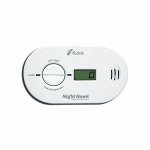srbaum
Member
- Joined
- Aug 30, 2010
- Messages
- 923
- Reaction score
- 3
- C Dory Year
- 2007
- C Dory Model
- 26 Venture
- Vessel Name
- Osprey
Art,
I'm sure you saw my recent post in the thread about "what did you do with your C-Dory today". My CO / fire alarm went off when the Wallas unit was not firing properly (working but only warm air coming out). I had been underway for a bit with heater on (ambient was around 46 degrees) and I thought that I was smelling an odd odor, (sort of a faint smell of moth balls (para-dichlorobenzene)), and figured my shirt must have been giving off the odor (though we don't wash or store our clothing around moth balls... Next thing that happened is the CO detector sounded off. I opened everything up and checked the Wallas, which was just warm air vice hot air blowing out while on the highest setting. At this point I had a headache... I shut the Wallas down (through its normal shutdown process) and lit it off again. Visible smoke could be seen out the exhaust and obviously there was a problem with the unit, as there was a lot of the un-combusted gases were coming from the internal portion of the Wallas, directly into the cabin. In summery I shipped the Wallas back to the West coast on 1/11 and it has been repaired (required a major tune-up) and being shipped back to me today.
Bottom line...I'm very glad that I replaced my smoke and CO detector (Kidde KN-COSM-XTR-B) last spring and it works very well.
I'm sure you saw my recent post in the thread about "what did you do with your C-Dory today". My CO / fire alarm went off when the Wallas unit was not firing properly (working but only warm air coming out). I had been underway for a bit with heater on (ambient was around 46 degrees) and I thought that I was smelling an odd odor, (sort of a faint smell of moth balls (para-dichlorobenzene)), and figured my shirt must have been giving off the odor (though we don't wash or store our clothing around moth balls... Next thing that happened is the CO detector sounded off. I opened everything up and checked the Wallas, which was just warm air vice hot air blowing out while on the highest setting. At this point I had a headache... I shut the Wallas down (through its normal shutdown process) and lit it off again. Visible smoke could be seen out the exhaust and obviously there was a problem with the unit, as there was a lot of the un-combusted gases were coming from the internal portion of the Wallas, directly into the cabin. In summery I shipped the Wallas back to the West coast on 1/11 and it has been repaired (required a major tune-up) and being shipped back to me today.
Bottom line...I'm very glad that I replaced my smoke and CO detector (Kidde KN-COSM-XTR-B) last spring and it works very well.

